De Amerikaanse schrijver Daniel Handler werd geboren op 28 februari 1970 in San Francisco, Californië Zie ook alle tags Daniel Handler op dit blog.
Uit: Why We Broke Up
“So it all went into the box and the box went into my closet with some shoes on top of it I never wear. Every last souvenir of the love we had, the prizes and the debris of this relationship, like the glitter in the gutter when the parade has passed, all the everything and whatnot kicked to the curb. I’m dumping the whole box back into your life, Ed, every item of you and me. I’m dumping this box on your porch, Ed, but it is you, Ed, who is getting dumped.
The thunk, I admit it, will make me smile. A rare thing lately. Lately I’ve been like Aimeé Rondelé in The Sky Cries Too, a movie, French, you haven’t seen. She plays an assassin and dress designer, and she only smiles twice in the whole film. Once is when the kingpin who killed her father gets thrown off the building, which is not the time I’m thinking of. It’s the time at the end, when she finally has the envelope with the photographs and burns it unopened in the gorgeous ashtray and she knows it’s over and lights a cigarette and stands in that perfect green of a dress watching the blackbirds swarm and flurry around the church spire.
I can see it. The world is right again, is the smile. I loved you and now here’s back your stuff, out of my life like you belong, is the smile. I know you can’t see it, not you, Ed, but maybe if I tell you the whole plot you’ll understand it this once, because even now I want you to see it. I don’t love you anymore, of course I don’t, but still there’s something I can show you. You know I want to be a director, but you could never truly see the movies in my head and that, Ed, is why we broke up.”

Daniel Handler (San Francisco, 28 februari 1970)
De Amerikaanse schrijver en historicus Dee Brown werd geboren op 28 februari 1908 in Alberta, Louisiana. Zie ook alle tags voor Dee Brown op dit blog.
Uit: Bury My Heart at Wounded Knee
“The decade following establishment of the “permanent Indian frontier” was a bad time for the eastern tribes. The great Cherokee nation had survived more than a hundred years of the white man’s wars, diseases, and whiskey, but now it was to be blotted out. Because the Cherokees numbered several thousands, their removal to the West was planned to be in gradual stages, but the discovery of Appalachian gold within their territory brought on a clamor for their immediate wholesale exodus. During the autumn of 1838, General Winfield Scott’s soldiers rounded them up and concentrated them into camps. (A few hundred escaped to the Smoky Mountains and many years later where given a small reservation in North Carolina.) From the prison camps they were started westward to Indian Territory. On the long winter trek, one of every four Cherokees died from the cold, hunger, or disease. They called the march their “trail of tears.” The Choctaws, Chickasaws, Creeks, and Seminoles also gave up their homelands in the South. In the North, surviving remnants of the Shawnees, Miamis, Ottawas, Hurons, Delawares, and many other once mighty tribes walked or traveled by horseback and wagon beyond the Mississippi, carrying their shabby goods, their rusty farming tools, and bags of seed corn. All of them arrived as refugees, poor relations, in the country of the proud and free Plains Indians.”
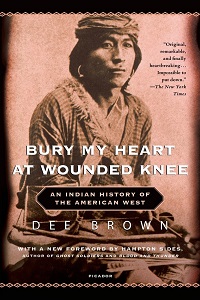
Dee Brown (28 februari 1908 – 12 december 2002)
Cover
De Duitse schrijver Berthold Auerbach (eig. Moyses Baruch) werd geboren op 28 februari 1812 in Nordstetten in het Zwarte Woud. Zie ook alle tags voor Berthold Auerbach op dit blog.
Uit: Das Landhaus am Rhein
“Nur noch Augenblicke Geduld! dort winkt ein Mann, der mitfahren will,« sagte der Ferge. Im Kahne saß ein Mann mit Frau und Tochter.
Der Mann war von kleiner Gestalt, mit grauen Haaren und röthlich funkelnder Gesichtsfarbe, blaue Augen schauten gutmüthig aber träumerisch müde drein; ein die Oberlippe ganz bedeckender struppiger Schnurrbart schien sich in dies harmlose Gesicht verirrt zu haben; er trug ein graues Sommergewand von jenem neumodischen Stoff, der überall derart weiß besprenkelt ist, als hätte sich der Träger in einem Federbett gewälzt; eine zierliche, mit blauen und rothen Perlen gestickte Bügeltasche hing an einem Riemen über der rechten Schulter.
Die Frau, groß und stattlich, mit unruhigen Augen und scharfen Zügen, die einstmals wol einnehmend gewesen waren, trug ein Kleid von mattgelber Seide; der weiße Schleier am grauen Hut war wie eine Binde am Turban um die Rundung gewunden. Sie warf den Kopf rasch zurück, sah dann vor sich nieder, als wollte sie sich nicht um den Fremden kümmern, und bohrte die Zwinge ihres großen Sonnenschirms in das Bord des Kahns.
Neben dem Manne saß eine schlanke blonde Mädchengestalt in blauem Sommergewand; den kleinen, mit einem Vogelflügel verzierten braunen Hut hielt sie am Gummiband in der Hand. Der Kopf war groß und schwer, die mächtige Stirn durch reichüberquellendes, in Flechten gelegtes Haar noch gewaltiger, und zwei dicke Locken legten sich rechts und links auf Schulter und Brust. Das Antlitz des Mädchens war heiter und unbefangen, klar wie der helle Tag, der über der Landschaft leuchtete.
Jetzt setzte sie den Hut auf, und die Mutter rückte ihr denselben noch etwas zurecht. Dann wechselte sie schnell die rauhledernen Stulpenhandschuhe mit glanzigen, die sie aus der Tasche nahm, und während sie mit Behendigkeit das Leder über die Hand zog, schaute sie nach dem Ankömmling.“
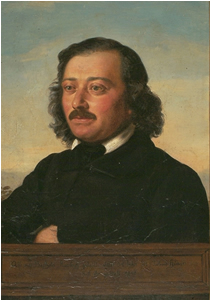
Berthold Auerbach (28 februari 1812 – 8 februari 1882)
Portret door Julius Hübner, ca. 1846
De Mexicaanse schrijver, filosoof en politicus José Vasconcelos Calderón werd geboren in Oaxaca op 28 februari 1882. Zie ook alle tags voor José Vasconcelos op dit blog.
Uit :A Brief History of Mexico (Vertaald door César Tort)
“The independence of the Latin American nations is the result of the disintegration of the Spanish empire. None of the nations of Latin America had, by a process of natural growth, reached the maturity required for emancipation. . . . . In the colonies, the men of clearer vision and greater patriotism, for example, the bishop Abad y Queipo, gave Mexico up for lost, and rightly so, after he saw that the independence was inevitable. . . .
From the beginning, the war was supposed to destroy the Spaniards, who represented the force and culture of the country, in the same way that later a fight against the criollo was developed, and today against the mestizo—all under the pretext of freeing the Indian—in order to uproot Spanish culture and replace it with American.
The two lands most imbued with Spanish influence, Mexico and Peru, resisted independence, which happened through foreign intervention. Peru was freed by Colombians and Argentines. . . .
In the United States, the independence movement was not a race war. For Morelos, for example, to be comparable to Washington, it must be assumed that Washington had decided to recruit blacks and mulattoes to kill the English. Instead, Washington disdained blacks and mulattoes and recruited the English of America, who did not commit the folly of killing their own brothers, uncles, and relatives, only because they were born in England. Quite the contrary, each participant of the American Revolution felt pride for his British ancestry and hoped for the betterment of the English. This should have been the sense of our own emancipation, to transform New Spain into an improved Spain, better than that of the peninsula but with its blood, our blood. The whole later disaster of Mexico is explained by the blind, criminal decision that emerged from the womb of Hidalgo’s mobs and is expressed in the suicidal cry: “Death to the Spaniards!”
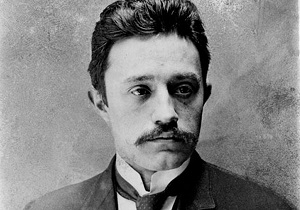
José Vasconcelos (28 februari 1882 – 30 juni 1959)
De Duitse dichteres en schrijfster Sophie Tieck werd geboren op 28 februari 1775 in Berlijn. Zie ook alle tags voor Sophie Tieck op dit blog.
Flore und Blanscheflur (Fragment)
Zu einer Zeit, wenn Sommerluft bezwungen
Den Winter, wenn die Blumen neu entspringen,
Und Gras und Kräuter aus dem Boden drungen
Und tausend Vögel aus den Lüften singen;
Die Bäche lieblich hin durch Grün geschlungen
Im Laufe über Kiesel scherzend klingen;
Wann bald April nun weicht der Lust des Maien
Wo alle Wonnen lieblich sich erneuen;
Da prangt im vollen Grün ein schöner Garten,
Dort konnte man versammelt herrlich schauen
Was man von Sommerwonne mag erwarten,
Das Laub des Waldes, und den Schmuck der Auen,
Die Glanz noch Duft noch keine Farbe sparten,
Und eine Schaar von Rittern und von Frauen,
Die so von Schönheit, Lieblichkeit umfunkelt,
Daß sie den Glanz des Gartens fast verdunkelt.
Der Sommer grünete in voller Güte,
Die Nachtigall vor allen Vögeln sang,
Es färbte sich roth, weiß, blau jede Blüte,
Die aus dem Boden, aus den Zweigen sprang,
Da lebten recht von neuem im Gemüthe
Die Wünsche derer, die die Minne zwang.
Durch Blumenglanz und holder Frauen Scherzen
Traf Liebesweh die unbewehrten Herzen.

Sophie Tieck (28 februari 1775 – 1 oktober 1833)
Berlijn, Alte Bibliothek
De Franse filosoof, schrijver en politicus Michel Eyquem de Montaigne werd geboren in Bordeaux op 28 februari 1533. Zie ook alle tags voor Michel de Montaigne op dit blog
Uit: Over vriendschap (Vertaald door F. de Graaff)
“Er is niets waarvoor de natuur ons zozeer schijnt te hebben voorbestemd als voor het sociale. Aristoteles zei al, dat de goede wetgevers meer aandacht hadden voor vriendschap dan voor rechtvaardigheid. Welnu, het sociale leven vindt zijn hoogtepunt en vervolmaking in de vriendschap. Want in het algemeen zijn alle relaties, die vanwege de sexuele aantrekkingskracht of de voordelen of omdat het voor het huiselijke of openbare leven noodzakelijk is, worden aangeknoopt en onderhouden, minder mooi en edel. Ze zijn niet zozeer als vriendschappen te bestempelen, en wel in de mate, waarin die andere motieven, doeleinden en voordelen, die met vriendschap niets te maken hebben, er een rol in spelen. Ook de vier klassieke relatietypen – familie, samenleving, gastvrijheid en sexuele relatie – kunnen nòch afzonderlijk, nòch tesamen op één lijn gesteld worden met vriendschap.
Wat een kind voor zijn vader voelt is eerder respect. Vriendschap wordt gevoed door vertrouwelijke gedachtenuitwisseling, hetgeen tussen vaders en kinderen, vanwege de te grote ongelijkheid, onmogelijk is en wellicht in botsing zou komen met hun natuurlijke familieplichten. Want het is voor vaders niet altijd mogelijk hun geheime gedachten aan hun kinderen te vertellen, om geen ongepaste mate van vertrouwelijkheid te laten ontstaan, terwijl anderzijds kinderen hun vader niet zouden kunnen vermanen en terechtwijzen, wat een van de belangrijkste vriendendiensten is. Er zijn volken bekend waar het gebruikelijk is, dat de vaders door hun kinderen worden gedood, en andere, waar de vaders hun kinderen doden, om te voorkomen dat ze mogelijkerwijze elkaar ooit in de weg staan en omdat de één volgens de wetten van de natuur afhankelijk is van de ondergang van de ander. Er zijn filosofen geweest, die deze natuurlijke band verachtten, zoals Aristippus6: als iemand hem onder ogen bracht, dat hij zijn kinderen genegenheid verschuldigd was, omdat ze uit hem voortgekomen waren, dan begon hij te spugen en zei, dat die spuug ook uit hem kwam en dat we ook luizen en wormen voortbrengen.”
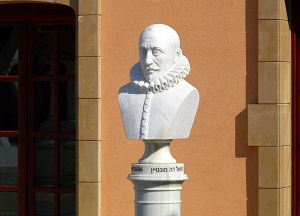
Michel de Montaigne (28 februari 1533 – 13 september 1592)
Borstbeeld in Caesarea
De Franse schrijver en filosoof Ernest Renan werd op 28 februari 1823 geboren in Tréguier in Bretagne uit een vissersfamilie. Zie ook alle tags voor Ernest Renan op dit blog.
Uit: Vie de Jésus
“Repose maintenant dans ta gloire, noble initiateur. Ton oeuvre est achevée; ta divinité est fondée. Ne crains plus de voir crouler par une faute l’édifice de tes efforts. Désormais hors des atteintes de la fragilité, tu assistera, du haut de la paix divine, aux conséquences infinies de tes actes. Au prix de quelques heures de souffrance, qui n’ont pas même atteint ta grande âme, tu as acheté la plus complète immortalité. Pour des milliers d’années, le monde va relever de toi. Drapeau de nos contradictions, tu sera le signe autour duquel se livrera la plus ardente bataille. Mille fois plus vivant, mille fois plus aimé depuis ta mort que durant les jours de ton passage ici-bas, tu deviendra à tel point la pierre angulaire de l’humanité, qu’arracher ton nom de ce monde serait l’ébranler jusqu’aux fondements. Entre toi et Dieu, on ne distinguera plus. Pleinement vainqueur de la mort, prends possession du royaume où te suivront, par la voie royale que tu as tracée, des siècles d’adorateurs. »
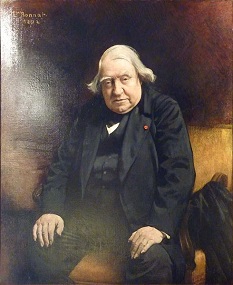
Ernest Renan (28 februari 1823 – 12 oktober 1892)
Portret in zijn geboortehuis in Tréguier
